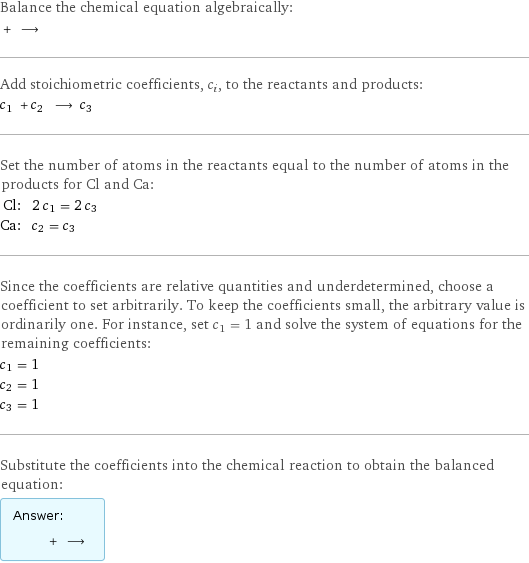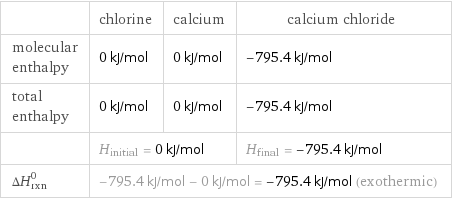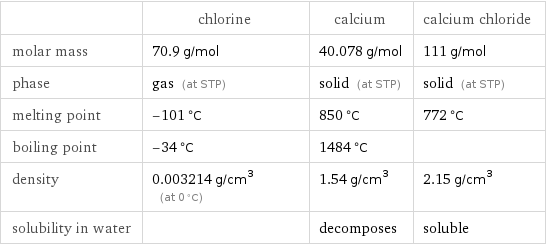Input interpretation

chlorine + calcium ⟶ calcium chloride
Balanced equation

Balance the chemical equation algebraically: + ⟶ Add stoichiometric coefficients, c_i, to the reactants and products: c_1 + c_2 ⟶ c_3 Set the number of atoms in the reactants equal to the number of atoms in the products for Cl and Ca: Cl: | 2 c_1 = 2 c_3 Ca: | c_2 = c_3 Since the coefficients are relative quantities and underdetermined, choose a coefficient to set arbitrarily. To keep the coefficients small, the arbitrary value is ordinarily one. For instance, set c_1 = 1 and solve the system of equations for the remaining coefficients: c_1 = 1 c_2 = 1 c_3 = 1 Substitute the coefficients into the chemical reaction to obtain the balanced equation: Answer: | | + ⟶
Structures

+ ⟶
Names

chlorine + calcium ⟶ calcium chloride
Reaction thermodynamics
Enthalpy

| chlorine | calcium | calcium chloride molecular enthalpy | 0 kJ/mol | 0 kJ/mol | -795.4 kJ/mol total enthalpy | 0 kJ/mol | 0 kJ/mol | -795.4 kJ/mol | H_initial = 0 kJ/mol | | H_final = -795.4 kJ/mol ΔH_rxn^0 | -795.4 kJ/mol - 0 kJ/mol = -795.4 kJ/mol (exothermic) | |
Chemical names and formulas

| chlorine | calcium | calcium chloride Hill formula | Cl_2 | Ca | CaCl_2 name | chlorine | calcium | calcium chloride IUPAC name | molecular chlorine | calcium | calcium dichloride
Substance properties

| chlorine | calcium | calcium chloride molar mass | 70.9 g/mol | 40.078 g/mol | 111 g/mol phase | gas (at STP) | solid (at STP) | solid (at STP) melting point | -101 °C | 850 °C | 772 °C boiling point | -34 °C | 1484 °C | density | 0.003214 g/cm^3 (at 0 °C) | 1.54 g/cm^3 | 2.15 g/cm^3 solubility in water | | decomposes | soluble
Units
